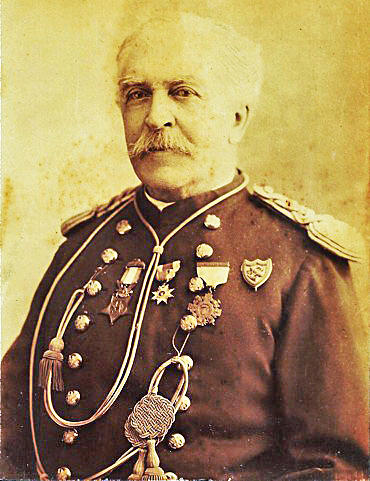

James Seaman Casey
Commanding Officer 22nd Infantry
January 21, 1895 - January 28, 1897
James S. Casey was born in Philadelphia, Pennsylvania on January 28, 1833.
On April 17, 1861 he enlisted as
a private in Co H
of the 7th Regiment of the New York State Militia. He was
discharged from the Militia on June 3, 1861.
He was offered a commission as a 2nd Lieutenant in the 5th US
infantry on August 5, 1861, a position
which he accepted on August 26 of that year. The 5th Infantry
spent the Civil War on duty in the
New Mexico Territory.
On September 25, 1861 Casey was
promoted to 1st Lieutenant. Promoted to Captain on December 1,
1863.
He must have been on detached service from the 5th Infantry at
some point during the war, as he became
Commissary of Musters for Major General J.G. Parke, Commander of
IX Corps, who, during the Battle
of Fort Stedman became the acting commander of the Army of the
Potomac.
On March 25, 1865 Casey was
breveted to Major for " gallant and meritorious service
during the attack by the enemy
on Fort Steedman (sic), Virginia."
After the war the 5th Infantry
was scattered among several posts in Kansas with its headquarters
at Fort Riley.
In the 1870's the 5th Infantry under Colonel Nelson Miles moved
to Montana and built a camp that would
later become Fort Keogh. Casey commanded Company A 5th Infantry
for at least seven years, for certain from 1877-1884.
In January 1877 Casey led
Company A at the battle of Wolf's Mountain, performing actions
during the engagement
which would later award him the Medal of Honor. (For his
performance during this battle he would also later receive
a brevet promotion to Lieutenant Colonel on February 27, 1890.)
In 1878 at Ft. Keogh, Montana,
he was found guilty of drunkeness on duty. Because of his record
he was returned
to duty by order of the President.
On June 27, 1884 Casey ended
twenty-three years of service with the 5th Infantry
when he was promoted to Major and transferred to the 17th
Infantry.
He was promoted to Lieutenant Colonel of the 1st Infantry on April 23, 1890.
Casey was promoted to Colonel of
the 22nd Infantry on January 21, 1895 and joined the Regiment
at Fort Keogh, Montana on March 4, 1895.
He commanded the 22nd Infantry
at Fort Keogh and at Fort Crook, Nebraska
until he retired from the Army on January 28, 1897.
He was an Original Companion of the Military Order of the Loyal Legion of the United States.
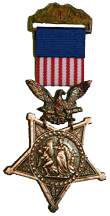
Medal of Honor - type
worn 1862-1896
This is the style of the medal as awarded to James S. Casey in
1894.
At the time of his retirement he would have worn the style
adopted in 1896,
shown in the photo at the top of this page and in the graphic for
his decorations below.
As a Captain in command of
Company A, 5th Infantry James S. Casey was awarded the Medal of
Honor
for his gallantry at the Battle of Wolf's Mountain in 1877, where
COL Nelson Miles
commanded Companies of the 5th, 17th and 22nd Infantry against a
coaltion of warriors
led by Crazy Horse. Casey & his company were deployed with a
field artillery piece (3 inch gun)
on the battlefield. Casey led a charge across open ground under
heavy fire
and took one of three hills commanding the field. The citation
for his Medal of Honor reads:
CASEY, JAMES S.
Rank and
Organization: Captain, 5th U.S. Infantry. Place
and Date: At Wolf Mountain, Mont., 8 January 1877.
Entered Service At: New York, N.Y. Birth:
Philadelphia, Pa. Date of Issue: 27 November
1894. Captain, 5th U.S. Infantry.
Place and Date: At Wolf Mountain, Mont., 8
January 1877. Entered Service At: New York,
N.Y. Birth: Philadelphia, Pa.
Date of Issue: 27 November 1894.
Citation:
Led his command in a successful charge against superior numbers of the enemy strongly posted.
The following is a narrative of the action at Wolf Mountain:
As the light
opened the two Napoleon guns exploded shells within the Indians'
lines, creating great consternation
among the savages. At one time they had completely surrounded the
command, but the key of the position
was a high bluff to the left of the line of troops, and the
sharpest fighting was for the possession of this ground.
The Indians who held it were led by Big Crow, a Medicine Man. He
rushed out in front of the warriors, attired
in a most gorgeous Indian battle costume of the brightest colors,
and with a head-dress made of the waving plumes
of the eagle falling down his back, jumped up and down, ran in a
circle and whooped and yelled like a madman.
Then a charge
was made by troops under Captains James S. Casey, Fifth Infantry,
and Edmund Butler,
Fourteenth Infantry, and Lieutenants Robert McDonald and Frank D.
Baldwin, Fifth Infantry. It was done
with splendid courage, vim and determination, although the men
were so encumbered with their heavy winter clothing,
and the snow was so deep, that it was impossible to move faster
than a slow walk. They were conspicuous in this charge
for their boldness and excellent judgment. In the very midst of
their daring acts of bravado, Big Crow fell, pierced by
a rifle shot, and his loss, together with the success of the
charge that had been made and the important ground gained,
seemed to cause a panic among the Indians, and they immediately
fled in utter rout up the valley down which they had come
a few hours before. The ground was covered with ice and snow to a
depth of from one to three feet, and the latter portion
of the engagement was fought in a blinding snow-storm, the troops
stumbling and falling in scaling the ice and
snow-covered cliffs from which the Indians were driven, with
serious loss in killed and wounded, through the
Wolf Mountains and in the direction of the Big Horn range. For
this gallant charge Captains Casey and Butler
and Lieutenant McDonald received the Medal of Honor. ¹
The following
is an article from SCHENECTADY Gazette
THURSDAY MORNING, MAY 12, 1960,
and describes the action for which
Casey received the Medal of Honor:
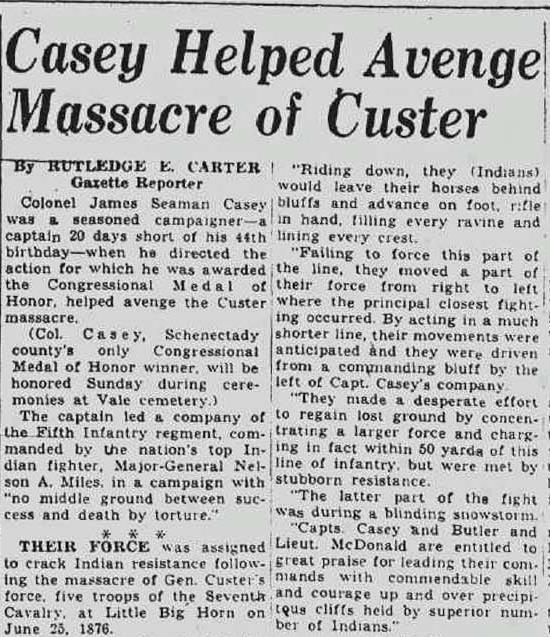
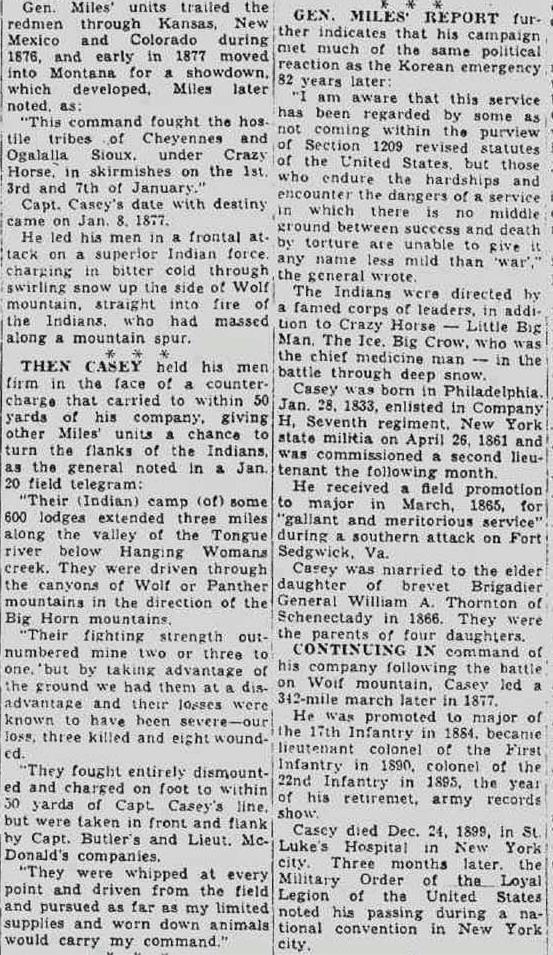
**********************
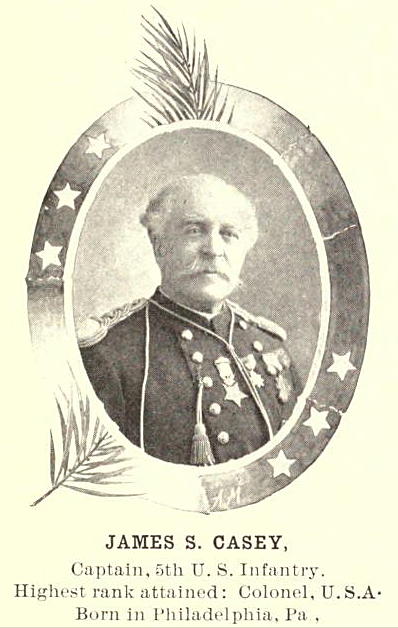 ¹
¹
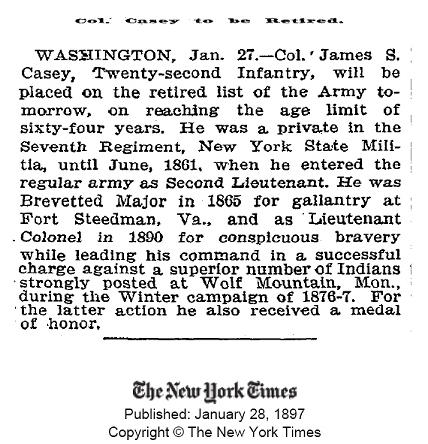
The announcement of the
retirement of James S. Casey,
in the New York Times, January 28, 1897
**********************
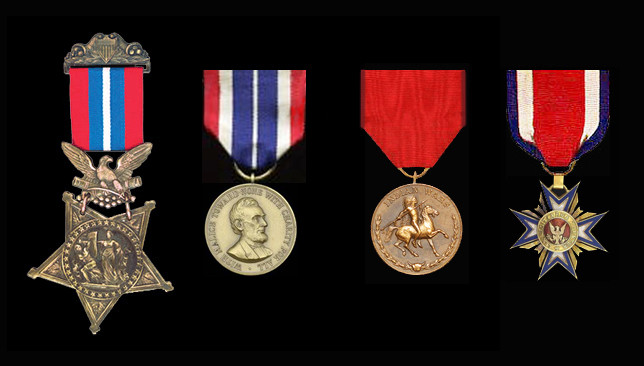
James S. Casey's
decorations
The Medal of Honor is the style from 1896-1904
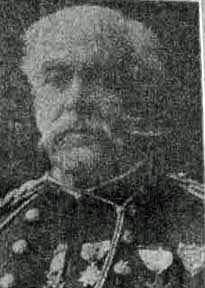
This portrait of Colonel Casey hung on
the wall at 1st Battalion 22nd Infantry Headquarters
at Fort Hood, Texas, 1999-2009. Photo courtesy of Major Anne
LeGare, wife of LTC Marc LeGare,
Commanding Officer 1-22 IN 1999-2001.
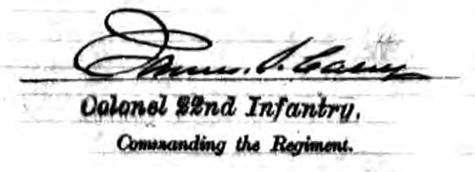
The signature of James S. Casey as
Commanding Officer of the 22nd Infantry
on the monthly Return of the 22nd Infantry for August 1895.
James S. Casey died December 25, 1899 and is buried at Vale Cemetery, Schenectady, NY.
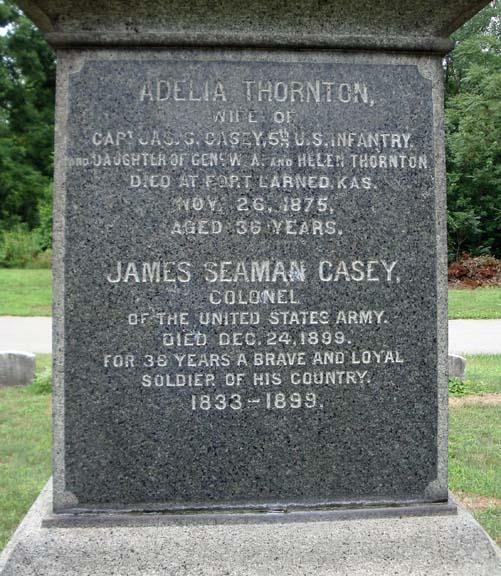
The base of
the obelisk at James S. Casey's grave at Vale Cemetery,
Schenectady, New York
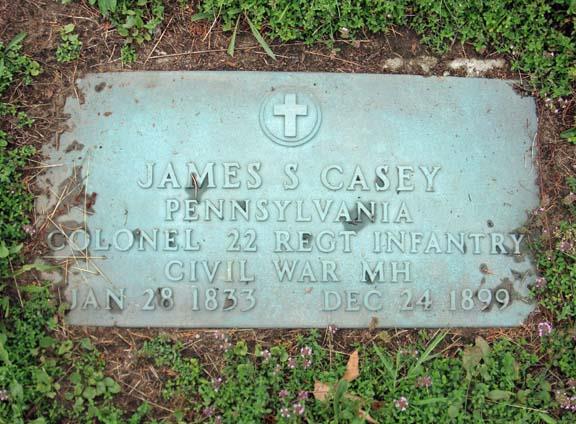
The grave marker for Colonel James Seaman Casey
¹ DEEDS OF VALOR How America's Heroes Won the
Medal of Honor, Volume II
by Walter F. Beyer and Oscar F. Keydel, The Perrien-Keydel
Company, Detroit, Michigan 1902
Article from the SCHENECTADY Gazette and
photos of James S. Casey's grave by Thomas Dunne
from the Find
A Grave website
Top photo by Patrick Darling from Ancestry.com
Home | Photos | Battles & History | Current |
Rosters & Reports | Medal of Honor | Killed
in Action |
Personnel Locator | Commanders | Station
List | Campaigns |
Honors | Insignia & Memorabilia | 4-42
Artillery | Taps |
What's New | Editorial | Links |